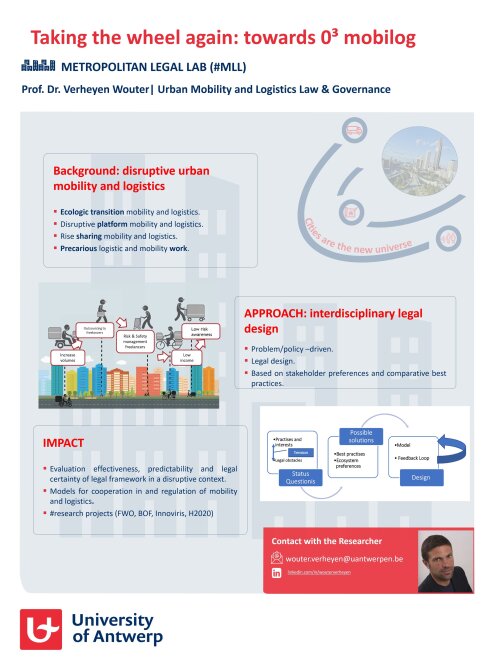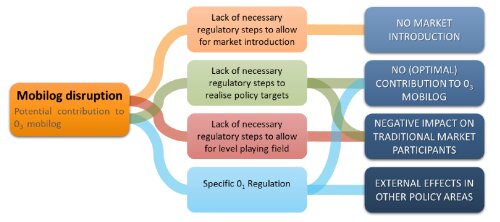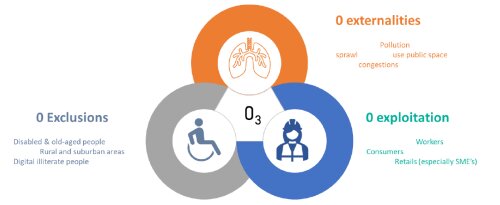Research plan: taking the wheel again

In the last decade, mobility and logistics underwent system changes. The rise of platforms and social internet created the breeding place for a multiplicity of innovative business models such as e-commerce -triggering double-digit growth numbers for parcel delivery services-, sharing mobility and logistics, gig mobility and logistics and micro-mobility to name some. More than ever human kind became homo mobilis. Further disruptions are following soon, with unmanned transportation just across the doorstep.
These innovations, together with the associated efficiency gains, have the potential to provide an important contribution to the major societal challenges in transport and mobility, such as reducing external effects (greening transport, facilitating a modal shift), reducing exclusions (by providing access to mobility and logistics to all businesses and customers) and reducing exploitation of mobility and logistics workers (by providing them fair working conditions). However, such contribution cannot be automatically assumed. As market-driven innovations, these emerging business models prioritise profit maximisation instead of contribution to the aforementioned policy targets. Hence regulation is required to navigate mobilog innovations towards sustainable business models. Regulation has been unable to follow the pace of transformation within the industry. This led to regulatory lacunae in some fields and potentially unnecessary obstacles to innovation in others.
While businesses innovations provide unique opportunities to shape the transformation towards 03 mobilog, the absence of appropriate regulatory responses causes industry innovations to insufficiently contribute to key policy targets in mobility and logistics, notably greening transport, improving social standards of workers and enhancing access to mobility and logistics for individuals and businesses. When a regulatory response does take place, specific policy targets are often addressed through different dedicated policy measures and regulation. An integrated 03 approach is, however, lacking. Sometimes policy measures in one domain can even have opposite effects in other domains.

My research agenda aims to provide regulators and ecosystem actors the tools to take the wheel again in steering towards 03 mobility and logistics: 0 negative external effects, 0 exclusions and 0 exploitation. Underlying the 03 objective lie multiple further policy targets.
The research will contribute to the 03 mobilog by building legal designs for 03 mobilog-regulation and contracts. This will be conducted by using the legal design method that I applied in multiple ongoing projects. Essential to this aim is the ecosystem approach, that necessitates an integration of transport law, mobility law, labour law and consumer law next to general commercial contracts law. Further cooperation is required with other fields of legal expertise such as tax law, competition law and administrative law. Moreover, as a tool to transition, this research will always be embedded in the societal context. This is being garanteed through interdisciplinary cooperation with, for example, transport economics and social work.
